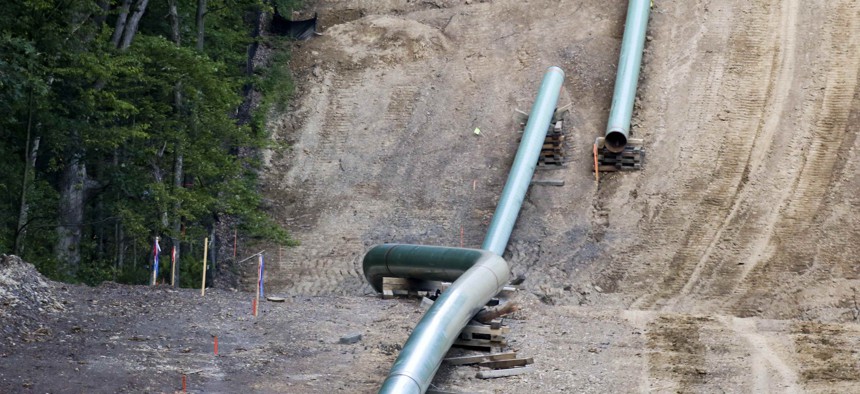Supreme Court Shows Interest in Clash Over Pipeline Builders Seizing State Land

Segments of assembled pipe are lined up along a cleared section of woods where a pipeline for shale gas was under construction during 2017 in Jackson Township, Pa. A new pipeline project in the region has led to controversy. AP Photo/Keith Srakocic

Connecting state and local government leaders
The high court is asking the Trump administration to offer its views on the New Jersey case, which involves a roughly $1 billion natural gas pipeline project.
A legal dispute over whether natural gas pipeline developers can use eminent domain power granted to them by the federal government to seize state land is getting attention from the U.S. Supreme Court.
The court on Monday asked the Trump administration to weigh in on the case, which pits the PennEast Pipeline Company against the state of New Jersey. The company is seeking to build a roughly $1 billion natural gas pipeline project. If completed in its entirety as planned, the pipeline would be about 120 miles long and would carry gas across Pennsylvania, from a region where it is mined, into New Jersey.
Under the federal Natural Gas Act, companies that receive certain approvals from the Federal Energy Regulatory Commission to build interstate natural gas pipelines are able to exercise the federal government’s power of eminent domain to “condemn” property in order to gain necessary rights-of-way for construction.
At issue in the pipeline case now pending before the Supreme Court is whether this eminent domain authority extends to the seizure of land that a state has a stake in. PennEast holds that it does. But New Jersey has argued that the Constitution's 11th Amendment prevents private parties from taking this sort of legal action against a state.
A federal district court sided with the company, saying that it had been vested with the federal government’s eminent domain powers, which would trump the 11th Amendment protection. But the 3rd U.S. Circuit Court of Appeals overturned the lower court ruling. After that, PennEast earlier this year asked the Supreme Court to hear the case.
The company argues that the lower court applied a flawed interpretation of the Natural Gas Act, and warns that if the 3rd Circuit ruling holds, it threatens to disrupt the construction of pipelines and other energy infrastructure, granting states a way to effectively veto interstate gas projects.
PennEast in 2018 sought to use the eminent domain power granted to pipeline builders under the Natural Gas Act to condemn 42 properties that the state of New Jersey claims an interest in.
Most of that property involves easements requiring land to be preserved for recreational, conservation or agricultural uses. New Jersey’s lawyers have said in court filings that the state has spent considerable effort and billions of dollars to preserve open space and farmland in the state.
In urging the Supreme Court to not hear the case, the state argues that the dispute does not present a situation where federal appeals courts are split on how to interpret the law. The state’s lawyers also say warnings about the appeals court ruling interfering with future pipeline construction are overblown.
And they note that the pipeline developers face hurdles beyond the case pending before the Supreme Court in that they haven’t received all of the required regulatory approvals they need to build the pipeline. Conservationists are also fighting the project in court.
The 3rd Circuit ruling raised the possibility of a workaround, where the federal government could condemn state property and then transfer it to pipeline builders in circumstances like the New Jersey case. But FERC has since said that it does not have any power to carry out this kind of eminent domain action.
PennEast is just one of the controversial gas pipeline projects pending in the eastern U.S. The Trump administration has promoted the construction of pipelines and other fossil fuel-related development throughout the president’s time in office.
In early June, the Environmental Protection Agency finalized a rule that weakened the ability states have to deny critical approvals under the Clean Water Act that projects like pipelines and coal terminals need in order to proceed.
About two weeks later, the Supreme Court issued a 7-2 decision that favored energy companies in a permitting dispute that called into question whether they could construct a pipeline crossing under the Appalachian Trail on national forest land in Virginia.
Enbridge Inc., South Jersey Industries Inc., New Jersey Resources, Southern Company Gas, and UGI Corporation are among the companies backing the PennEast project.
There are now plans in the works to construct it in two phases, with a 68-mile segment entirely in Pennsylvania constructed first and the New Jersey section completed at a later time.
Bill Lucia is a senior reporter for Route Fifty and is based in Olympia, Washington.

NEXT STORY: Technology choices must reflect our changed environment





